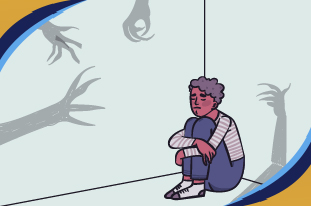Anxious attachment is a style of attachment in which a child may have a development of an insecure relationship with their parents or caregivers. Moreover, this type of attachment style not only affects the children but it also has an adverse impact on the relationship of adults as well.
Attachment trait is inbuilt in every human being. It’s just that it differs in the capability of making emotional bonds with different people. This blog is all about the basic understanding of anxious attachment, signs of anxious attachment, traits of anxious attachment, the causes, and how to fix anxious attachment style with anxious attachment therapy, how to not be anxiously attached, how to work on anxious attachment style, and how to stop being anxiously attached.
Understanding Anxious Attachment
Anxious attachment is developed in a person when their parent or caregiver is not able to build that connection between them and the child. This eventually conditions the baby to think that their needs can’t be met whatever happens.
Causes Of Anxious Attachment
Every behavior has a complete history of the underlying causes. Same goes for the anxious attachment. Some of the common causes can be:
- Extreme trauma
- Emotional ignorance
- Separation from the parents
- Newly made caregivers
- Lack of parenting skills
- Depressive caregiver
Prevalence rate of anxious attachment
Although, there is no particular figure that completely states the prevalence of anxious attachment in a child. Furthermore, there is no such clinical diagnosis of anxious attachment. Therefore, an estimated prevalence figure is presented based on the surveys. Various researches show that at least 40 percent or more of this struggle with anxious attachment style signs.
Categories Of Anxious Attachment
There are a total of 4 common attachment styles widely experienced by different types of people. Moreover, there are different names given to these styles by different therapists but the most widely used are:
- Disorganized
- Avoidant
- Secure
- Ambivalent
These attachment styles play an important role in shaping up the overall personality of the person. Moreover, this is the fundamental thing that allows a person to behave in a particular way with their friends, or partner.
Read More: Can Anxiety Disorder Cause High Blood Pressure? Insights About The Connection
Traits Of Anxious Attachment
There are certain anxious attachment traits that distinct them from other styles of attachment. Anxious attachment can develop in both children and adults. These are as follows:
These are the common signs that a person feels regardless of age:
- You have a hard time in accepting criticism
- You don’t like to be alone
- You experience lowered self-esteem
- You think you can function independently
- You fear emotions
- You don’t consider the feelings of other people
- You need intimacy but fear to trust others
Symptoms of Anxious attachment in children are as follows:
- A child may start to weep and is almost near to impossible to console.
- Showing anxiousness when a parent or caregiver leaves them.
- Exhibiting clinginess towards their caregiving figures.
- Absence of the urge to explore new things.
- Being usually anxious
- Avoiding interaction with others
- Difficulty in managing negative feelings
- Showing anger and lack of socialization among peers
Read More: Understanding The Connection Between Male Depression And Emotional Affairs
Anxious attachment in a adult relationship can appear to be like:
- Facing difficulty in accepting b breakup
- Desire to ghost someone when they really need you
- Issues showing vulnerability
- Unable to build boundaries
- Shows a clingy behavior
- Feelings of jealousy
- Ruining a relationship with a quarrel
- Experiencing anxiety when you are not close to your special one
- Showing a constant assurance seeking behavior
An important part of learning about anxious attachment is that the manifestation of signs of anxious attachment does not primarily base on your childhood. It simply means that you never experienced the required attention from your caregiver or parents. Furthermore, other factors like your personality and overall life experiences play an important role.

Primary Triggers Of Anxious Attachment
Every attachment style has different triggers. Similarly, anxious attachment consists of a list of triggers that play an important role in the onset of anxious attachment signs. The common ones are being fearful of rejection or being alone. And in such a scenario, even a small conflict and verbal fight between two people can be a triggering point for the sufferer. Therefore, some small acts of your partner such as:
- You find out that your partner is being dishonest to you.
- Your partner all of sudden loses interest in you.
- You think you are being pressurized to maintain a commitment
- Your partner suddenly demands for extra attention and care.
- There is a disruption in your partner’s behavior.
- You find your partner struggling in managing their emotions.
Now, the triggers can be different for every person, but having a basic knowledge about them can be the first step towards a healed mind and stronger relations.
Recovery from anxious attachment
The secret in getting out of the chains of anxious attachment always lies in the quality and options available in therapeutic approach. The following are some of the effective and proven mental health treatment options for treating anxious attachment:
-
Self awareness:
A normal person will never understand why they are acting in a certain way in a relationship. Therefore, pausing for some time before exhibiting the behavior can be beneficial in avoiding the conflict. Always self work on your behavior and the circumstances it can lead to.
-
Polish your communication skill:
The result of a conversation always depends on the way a person puts up a word and conveys their message to the other person. The key is always to use clear communication and be clear about what you meant. Observing the non verbal cues as well can be a plus point in leading a healthy conversation with your partner such as the posture, and expressions. This will allow you to understand the real feelings of your partner meaning how they are actually feeling.
-
Seeking professional help:
If you are experiencing issues in your personal relationship with your partner and you think the situation is getting out of hand now. Then seeking professional psychiatric assistance is the best approach in such a scenario. As therapy has the power to solve unresolved matters and end an ongoing distressing argument between you and your partner.
-
Build positive patterns:
Consulting to a mental health therapist can be beneficial in recognizing the troubling patterns and turning them into positive healthy ones with the help of different techniques. Moreover, you can learn to react in a better and less hurting way to your partner in a conflict.
-
Tying knots with someone securely attached:
For a sufferer of anxious attachment it is a bit distressing and overwhelming to form a relationship with someone who is securely attached. But, if you look and think closely this will only aid you in understanding the real meaning of a safe and secure relationship with someone. Another thing you can do to experience safety in a relationship is to connect with people with increased self esteem, and strong boundaries.
-
Learning secure behavior:
A perfect way to explain this is to feel the same way one feels when they are spending time alone. Additionally, you can practice with sharing the way you feel with your partner or a close friend but ensure that without feeling emotional and forsaken. This practice will definitely make you feel a bit uncomfortable at first but then you will surely feel a bit secure.
Ways to self manage the signs of anxious attachment
Whenever you think that a certain provoking situation has happened, then you can find mental solace in trying the following self soothing tips:
- Learning and implementing breathing exercises
- Indulging into some exercise
- Walking in the woods or in lawn
- Listen to some good soothing music, hit the spa and get a soothing massage
- The most important thing to treat yourself positively
- Explore creative ways to express your inner feelings that you think you can’t share with anyone.
Read More: Understanding The Different Types Of Trauma
How can you change your attachment style?
Anxious attachment can make things troubling for a person, but this does not mean that they can not enjoy and experience a healthy relationship with their partners. Furthermore, it really doesn’t matter what attachment style you have with the right strategies you can surely excel at the art of building healthy interpersonal relationships.
Some of the short term but effective coping strategies are:
-
Awareness:
Having a handful of knowledge about the different types of attachment styles is important this will help you in understanding which attachment style implements on you as per your exhibiting traits.
-
Journal keeping:
For some people nothing is a therapy. Therefore, a good approach is to write down your cognitions, and the way you are feeling. This will help you in deeply learning about the way you should think and then behave. Moreover, you can always bring your written thoughts and feelings to a session with a mental health therapist.
-
Learning mindfulness:
Watching videos of mindfulness and then implementing them into your routine can be very beneficial for you managing your negative signs of attachment style. Some of the commonly available mindfulness techniques are meditation, and deep breathing.
-
Observe your partner’s attachment style:
Sometimes it all depends on the company you have, such as your partner. If they have a secure attachment style then this will aid you in understanding the real meaning of safe attachment.
We have talked about the short term techniques, now here is the list of long term strategies:
-
Individual Therapy:
There is no compulsion of being in a relationship with someone in order to efficiently understand the attachment style challenges you are facing. You can even on your own observe your attachment style and then identify the loopholes. Additionally, you can learn the various approaches which can lead to a healthy interpersonal relationship.
-
Couples Therapy:
Many times, a conflict takes the shape of a much bigger problem when both the partners are unable to share their feelings, and thoughts. Therefore, the aim of couples therapy is to provide such couples with a safe environment to freely share their feelings. Moreover, the couple can learn about several healthy ways to communicate to avoid any conflicts.
-
Group Therapy:
The effectiveness of a treatment increases when a person can relate to other people like them experiencing the same situation. Therefore, group therapy is best in making the sufferer feel less lonely and encourages that they are not alone.
Read More: What Is The Story Behind People Pleasing Trauma Response
Therapeutic Approaches for attachment styles
The proven and best therapies for attachment styles are as follows:
-
Psychodynamic Psychotherapy:
The foundation of this type of psychotherapy is deep understanding and exploration of unaware feelings and how they are impacting the bonding and a person’s relationship with their partners.
-
Cognitive Behavioral Therapy:
This is the particular psychotherapy that typically emphasizes on altering the negative thoughts into healthy and positive ones. Moreover, if untreated a person can suffer from adjustment disorder, GAD, specific phobia, ADHD, depression, OCD, mood disorder, panic disorder, MDD, trauma, bipolar disorder, and acute stress.
-
Interpersonal Therapy (IPT):
This is beneficial and applied to people struggling with interpersonal issues. The focus is on strengthening the interpersonal skills of a person with the help of therapy.
Wrapping Up!
Anxious attachment shows its roots from childhood and then in later life it affects a person’s relationship and the way they interact with others. Furthermore, it prevents such people from forming emotional bonds with other people, particularly their partners. While it has a real bad impact on the interpersonal relationships of a person, knowing the signs, causes and available treatment is crucial. Some major and effective techniques are learning about various types of attachment styles, adapting new and better ways of communication, and adding mindfulness in your lives. Adopting these techniques can help you get rid of anxious attachment and develop secure attachment with your loved ones. You can attain the benefits of Orange Coast Psychiatry telehealth services today!
























